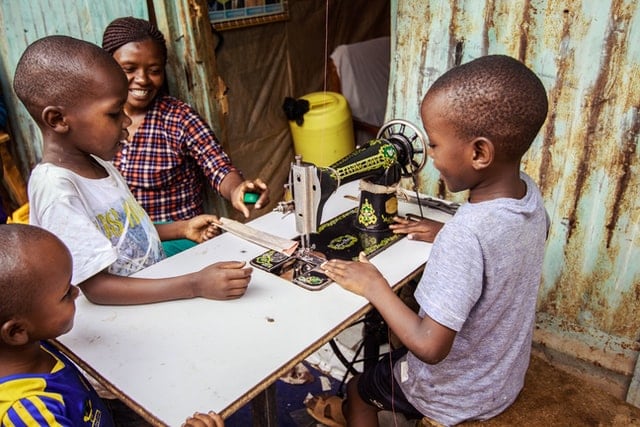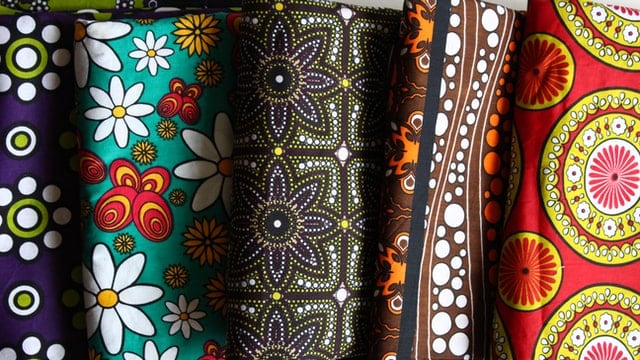interview with Mr Abel Kamau – Kenya Association of Manufacturers (KAM) Sectors Executive
By: Behnam Ghasemi
How do you evaluate the textile and garment industry in Kenya?
The textiles and apparels sector is the most labour intensive sector of the manufacturing industry. It has the ability to create a large number of employment opportunities within a short duration of time. This explains the national and regional special focus on the sector.
The development of the sector’s farm–fashion value chain presents the country with immense opportunities in cotton farming, textile mills and apparel/fashion industry.
First, the sector is considered as a creator of mass employment across low to high skill sets. A fully developed value chain has the capacity to employ about 10% of the country’s population. Additionally, cotton farming and apparels manufacturing are very labour intensive; thus being a source of much-needed employment opportunities. The value chain is also an important driver of inclusivity as it employs women in excess of 60%.
The textiles and apparels sector is currently a critical foreign exchange earner in the manufacturing industry. Kenya as at now is the largest exporter of apparel under AGOA with about Ksh. 47billion worth of exports in 2019 and Ksh 39 billion in 2020.
With the changes in the global apparels sourcing supply chain in the world, Kenya has been able to attract a substantial number of world buyers and these figures can grow when we enhance our competitiveness and diversify our markets.
Lastly, the sector provides an opportunity for the enhancement of industrialization within the country and region through forwarding and backward linkages with other economic sectors.
What do you think about the future of the textile and garment industry in Africa in general and Kenya especially?
● The textiles and apparels sector has historically been the pioneer industry that drives industrialization around the world.
● An analysis of major international companies illustrates this as many of them started out with operations in the textiles and apparels sector value chain. The situation is not different in Kenya as many of Kenya’s top companies have their genesis in the textiles and apparels sector.
● The growth of the value chain in Kenya will translate to more players in the manufacturing space and who will ultimately diversify into other manufacturing sectors.
● The sector has the ability to fill in the gaps in our economy, our social challenges and our industrialization journey. With the coming of the 4th industrial revolution and the changes in the global manufacturing, consumption and sourcing dynamics; Kenya lies at a good position to turn the waves into energy that will propel the country to the next textiles and apparels manufacturing frontier.
● The Sector has so far been able to attract reputable global buyers and investment. There are also strategic policy and infrastructural developments that seek to place Kenya as the regional hub for the manufacture of textiles and apparels.
● With the adoption of Export driven trade; the textiles and apparels sector has been prioritized as a growth sector with the European Union, American and African market being priority markets.
● Kenya has been able to sustain its position as the top apparels exporter to the United states under the AGOA progam and is looking towards scaling up this success.
Kenya has a big potential in the textile sector, why should international investors invest in the Kenya textile market?
There are various reasons as to why investors should tap into the Kenya Textile market. These include:
○ Availability of highly trained/ trainable labour
○ Productive workforce
○ Preferential access to the USA, EU, UK, EAC, COMESA and now the African continent
○ Market-driven economy
○ Efficient logistics link to the global world
How many textile and garment manufacturers are active in Kenya?
About 30 big manufacturers focus on the Export markets outside Africa. Over 500 big and medium-sized domestic companies focus on local and regional markets and numerous other smaller players in the informal sector.
Please explain more about import and export numbers in Kenya textile and apparel sector.
Kenya imports about USD $ 833,000,000 of textiles and apparel with apparel being about 30% of this value.
● Of the high-volume imports are fabrics for use in the manufacture of apparel for export purposes. This presents an opportunity for the country to provide fabric inputs to the export-oriented industry by addressing the competitiveness gaps facing the local textile sector.
● On the other hand, Kenya exports textiles and apparel worth about $500,000,000 with the bulk of this being Apparel Exports under the AGOA regime.
How do you evaluate Kenyan government policies and support of the textile sector?
● The policy environment has a vision for the sector under the Kenya Industrial Transportation Program, Big 4 Agenda and The Vision 2030.
● However, there are various factors that continue to hinder the growth of the manufacturing sector. Our core issues remain competitiveness and productivity without which, the local manufacturing sector shall not be able to venture into local and export markets.
● Our Manufacturing Priority Agenda 2021 identifies some of the key issues we see as hindering the competitiveness of Kenya’s manufacturing sector. Some of these include overbearing and constantly shifting regulation, cost and consistency of energy, transport and logistics costs.
● Unfortunately, the increased cost associated with these added to the price of a final product, hinders our competitiveness.
● As Kenya boasts itself of its continued excellence in Ease of Doing business, we are also pushing the government to address the Cost of Doing business accordingly.
African countries are facing a big problem with second-hand cloth and garments that they import to their country. What is your plan against this in Kenya? And how does it affect the Africa textile and garment industry?
The value of imported secondhand clothes, commonly referred to as Mitumba, rose to Kshs 18 billion and 184,377 tons as at the end of 2019 (KAM). In its initial years, secondhand clothes provided access to clothing for the less privileged in Kenya and the larger world.
However, it is worth noting that mitumba trade has over time been used by scrupulous traders to import and export new clothing disguised as second hand. This creates a big loophole that further erodes the competitiveness of the locally manufactured textiles and apparels products through unfair competition
We advocate for strict enforcement of customs and standards measures so as to ensure that the secondhand trade is regulated appropriately and only genuine second-hand is allowed in the country; thus, creating a fair playing field.
Today sustainability and green products are a must and unfortunately textile is one of the most polluting industries. How can we improve sustainability in the textile industry? What is Kenyan textile and garment manufacturers’ sustainability policy?
Kenya has a good level of sustainability; explaining the reason to why the country has been able to attract and retain top buyers across the world
The international leather and textile value chains are making concerted efforts towards going green and reducing their ecological footprint. Most of this change is being driven by large global fashion brands, who require the suppliers in their supply chains to adhere to internationally agreed standards on wastewater and chemical management.
For East African businesses, being unable to comply with these standards creates a risk of being left out of global supply chains and represents a high cost in missed export market opportunities. It is thus of paramount importance, both environmentally and economically, to empower East African businesses in improving compliance.
Despite the presence of comprehensive global standards and best practices, such as those promoted by international initiatives, an understanding of the necessary steps towards compliance is lacking in East Africa.
Local policymakers, enforcement authorities and manufacturers find it difficult to align local legislation with international standards due to this information asymmetry. Even when there is a fair understanding of the sustainability requirements from global brands, poor access to finance and inadequate technical capacity thwart better compliance.
It is in line with this that we recently launched The Sustainability Report for Textile and Leather sectors in partnership with the International Trade Centre (ITC).
The Reports are set to guide industry players and policymakers, in aligning their manufacturing processes and policy, with global trends.
At the Kenya Association of Manufacturers, we house the Center for Green Growth that has progressively been able to support our members on their sustainability journey.

Please let us know more details about Kenya Association of Manufacturers
KAM is a Business Member Organization established in 1959 representing value-add companies and associate services in Kenya. The Association provides an essential link for cooperation, dialogue and understanding with the Government and other key stakeholders
KAM serves its members through its 14 different sectors including Textiles and apparel and has a physical presence in 7 regions in Kenya. Its mission is to promote competitive and sustainable local manufacturing.
KAM promotes trade and investment, upholds standards, encourages the formulation, enactment and administration of sound policies that facilitate a competitive business environment and reduce the cost of doing business.
The Association houses the Global Compact Network Kenya and its CEO – Ms. Phyllis Wakiaga is the Network Board Chair.
The various ways in which KAM supports its members include:
1. Policy Advocacy including:
● Fact-based policy advocacy with Government and its agencies on various issues such as taxation, trade infrastructure, energy, illicit trade and regulations, among others
● Engagement at the county level
● Business information on trade agreements under various regimes including East African Community (EAC), Common Market for Eastern and Southern Africa (COMESA), South African Development Corporation (SADC), Africa Growth Opportunities Act (AGOA), Africa Continental Free Trade Area (AfCFTA)
● Technical advice on taxation and fiscal policy
● Access to regulatory and compliance requisites to set up businesses, and
● Promotion of ethical business practices
2. Enhancing competitiveness & tenacity
● KAM offers various Business Development and Competitiveness Services that are tailored to build competitiveness, productivity, resilience and support the manufacturing sector’s journey to green growth.
These include:
A. Securing the Future of Work
● The Manufacturing Academy
○ KAM hosts the Manufacturing Academy: The Manufacturing Academy provides technical and/or specialized management training and services to drive competitiveness in local industry.
○ The Academy ensures that manufacturers remain at the cutting edge of the latest manufacturing research findings and service technology to enable them to remain competitive.
● Technical, Vocation Education and Training (TVET) program:
○ KAM’s TVET program, run in partnership with German Development Corporation enhances access to technical and vocational jobs as well as economic opportunities for the youth in Kenya, through skills and entrepreneurship development.
○ The program offers internship opportunities, competence-based education and training and work-readiness training for technical courses graduates in the country.
○ It ensures skilled human resources in the manufacturing sector and addresses the current high unemployment rates, often occasioned by lack of experience.
B. Promoting Market Access
● KAM strengthens and scale ups trade, productivity and export market development for local manufacturers through its Business Information Services Desk.
● The services offered include seminars and workshops on compliance issues, trade and investment missions and productivity courses.
● KAM also hosts its annual Changamka Shopping Festival that brings together local manufacturers to showcase the high quality of locally manufactured goods and sell their products to the public at discounted prices.
C. Scaling up SMEs
● Through our Manufacturing SME Hub, we address challenges affecting SMEs in the country, including unfriendly policies and regulatory regime, tedious and lengthy process in quality standards and certifications, access to markets, access to affordable finance and poor governance structures.
● The Hub fosters the development of a flourishing entrepreneurial culture and competitive small and medium manufacturers in Kenya and in the region.
o Services offered through the Hub include:
● Business advisory services
● Tailored technical, operational and management trainings
● Access to finance through business planning, financial literacy programmes and linkages to financiers
● Access to markets through value chain linkages, trade missions and expos, export market linkages, trade related seminars and conferences.
D. Towards Green Growth and Circular Economy
● Through the Centre for Green Growth and Climate Change (CGGCC), KAM provides a one-stop solution to deepen industry level interventions, promote a circular economy, promote climate change actions, and financial linkages that prioritise people and planet.
● The Centre’s services include resource efficiency services (energy, water & wastewater audits, waste, and circular economy resource mapping), capacity building and green financing.
● The Centre also organizes expos and the Energy Management Awards to recognize and award the best performing industries. This is aimed at increasing awareness on energy efficiency, sustainability, renewable energy, and circular economy.
E. Inclusivity and Bridging the gender Gap
● KAM hosts the Women in Manufacturing (WIM) Programme, which provides a platform for women to network, be mentored and to improve their competitiveness and access to local, regional and global markets.
● Initiatives geared towards supporting women in manufacturing include:
○ The annual Women in Manufacturing (WIM) Gala Dinner that celebrates women and recognizes their role in the manufacturing sector.
○ Linkages with successful women industrialists across the continent and in the world.
○ Market linkages across East Africa, the continent and the world.
○ Exchange programs to enhance the quality of women in manufacturing products to ensure their inclusion into regional and global supply chains
○ Advocacy for policies and instruments from relevant institutions to enable women to access regional and global markets.
○ Capacity building and mentorship programs to equip women in manufacturing with the relevant skills and knowledge to grow their businesses.
○ Mentoring young women to take up and soar in Science, Technology, Arts and Mathematics (STEAM) courses to take up more manufacturing-related jobs, through our Technical and Vocational Education and Training (TVET) program
Let us know about services that KAM offers to Kenyan textile manufacturers and foreign investors in the textile and garment sector?
The textiles and apparels sector has been identified as a priority sector by the Kenyan Government. Its prominence in the manufacturing pillar under the Big 4 Agenda and the Kenya Industrial Transformation Program is a manifestation of benefit to the country’s economy.
Some key benefits of KAM Membership include:
KAM will advocate for you for a conducive business environment. We articulate to the Government and other stakeholders, on the cost of doing business (energy, taxation, illicit trade, counterfeits), Predictable policies and regulations and Budgetary proposals and amendments
● Providing trade advisory and market access support on Local, Regional, and Global markets.
● Facilitating Exports under Duty Remission Scheme such as Africa’s Growth Opportunity Act (AGOA)
● Facilitating the licensing and permits at the National and County levels
● Intervention and engagement of county governments
● Provide industry driven training, seminars and workshops
● Compliance support
● Assistance on monitoring and evaluating progress on Global Compact commitments.
● Access to regulatory and compliance requisites.
How do you evaluate the textile industry and international markets in 2021 after Coronavirus Pandemic?
It was one of the worst hit sectors. However, it was one of the beneficiaries of the pandemic’s silver lining through the manufacture of PPEs. The Sector was able to Keep Kenya Moving, having ramped up their production to ensure that the country has a constant supply of PPEs.
Post covid situation and also during the new normal; the global textiles and apparels market will be tested for flexibility and resilience.
The rise of smaller runs is expected as buyers and retail stores try to manage lean and fast-moving inventory in light of the uncertainty in the market.
We urge government to create an enabling environment to support the sector’s growth since it has already demonstrated its capacity


























This is a very good report from Mr. Abel Kamau. Give a very important and interesting details for the Textile Industry and apparel going forward. I’m working to find a Textile suppliers in Kenia to expand our core business of textile and ship to all Asia countries we have a manufacturing garments. Please help to provide an information of the best 10 textile mills and bigger industry for my reference, contact information as email, web, profiles, etc. This will be very helpful.